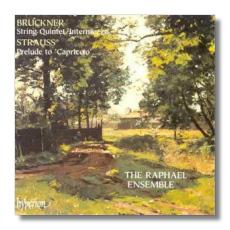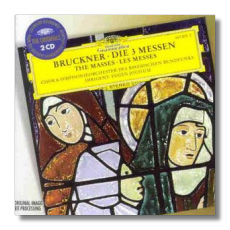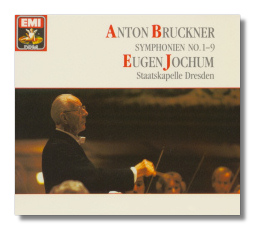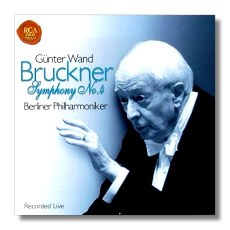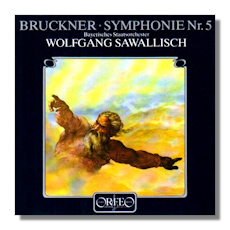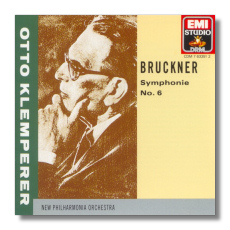
The Internet's Premier Classical Music Source
Related Links
- Recommended Recordings
Recommended Biographies
Recommended Scores
CD / DVD Reviews - The Eternal Student
- The "Completed" Ninth
- Bruckner and Mahler
-
Find CDs & Downloads
Amazon - UK - Germany - Canada - France - Japan
ArkivMusic - CD Universe
Find DVDs & Blu-ray
Amazon - UK - Germany - Canada - France - Japan
ArkivMusic-Video Universe
Find Scores & Sheet Music
Sheet Music Plus -
- Anton Bruckner Works List
by Paul Geffen - Bruckner Symphony Discography
by John Berky - Bruckner Symphony Versions
by David Griegel - Bruckner Discography
by Hans Roelofs - Bruckner for Brucknerites
by Guillem Calaforra - The Bruckner Journal
- Anton Bruckner & 19th-Century Austrian Music, Culture and Society
by Yutaka Yamada - Bruckner Page
by Joachim Neusser - Bruckner Shrine
by Andrew Stringer - Fritz Oeser Website
Recommended Links
Site News
Anton Bruckner

(1824 - 1896)
Anton Bruckner, a giant of the 19th-century symphony, was born on September 4, 1824, in the rural Austrian town of Ansfelden. Bruckner was from a musical and deeply pious family of Roman Catholics; his father was a schoolmaster-organist who gave Anton beginning keyboard and violin lessons, while his mother was a vocalist in the local church choir. Bruckner showed a musical gift from childhood, becoming proficient enough by the age of ten to serve as assistant organist during mass. Anton, perhaps being the favorite of five children, was sent to St. Florian Monastery after his father's 1837 death, began work as a choir boy, and received a thorough education. Bruckner's voice broke in 1839 and he decided to likewise pursue a schoolmaster-organist career. He took up required courses at Linz, which included music theory; under well-known theorist August Dürrnberger, he was first exposed in detail to secular works, such as by Beethoven and Mozart.
The teaching salaries earned by Bruckner were poor and the work itself a distraction from compositional goals. But through his skills as a keyboard player, Bruckner found his way to the assistant organist position at St. Florian, where he stayed for ten years, and organist at Linz Cathedral for thirteen more. The Linz period was vital to his creative life, as he received lessons by mail from Simon Sechter, a Viennese who briefly taught Schubert. Grueling exams and certifications from the Vienna Conservatory would follow, although Bruckner's musical proficiencies were never in doubt. Through the encouragement of friends, Bruckner found work in Vienna as theory teacher at the College of St. Anna and as an instrumentalist. He was also invited to play organ at churches throughout Europe and received wide acclaim. Convinced of his musical future, Bruckner remained in Vienna until his death. His once-peaceful life would become drenched in controversy along the way.
Bruckner had written numerous vocal and orchestral pieces for church performance, but his first serious attempts at concert music did not occur until the 1860s, when he began projects under the tutelage of Otto Kitzler. During his time with this modernist, Bruckner fell under the potent charm of Wagner, whose ultra-chromatic style brought change to the Austrian's own. Bruckner's church music sat well with audiences, but his symphonies, for which he is best known today, were radical in scope and hostilely received. He became a personal friend of Richard Wagner, a friendship causing even greater discord with followers of Johannes Brahms and conservative tradition. Bruckner took on the mark of an overblown Wagnerian; after modest success with his Symphony Number 2 (1871-2), Symphony Number 3 (1873-7) had a disastrous premiére, although a supportive audience member was 17-year-old Gustav Mahler. His later symphonies, particularly Numbers 5 (1875-6) and 7 (1881-3), had their share of applause, but also widespread hisses and harsh reviews in the press. Local orchestras, including the Vienna Philharmonic, were reluctant to perform Bruckner's compositions, usually deemed formless, too long, and unmarketable.
Even today, this deeply meditative music poses a challenge to listeners. The nine symphonies, most spanning an hour in length, gradually unfold over broad landscapes. Bruckner's symphonies begin quietly and take the shape of theme and variation; an opening theme is smoothly spun, which initiates a synthesis to take place over the entire work. The music is a reflection of Bruckner's Catholic faith, often taking on a medieval quality and reminiscent of church modes. Moments of high drama, quiet ponderousness, and absolute silence lie side by side, forming a coherent whole beyond the limits of earthly reality. A Bruckner symphony does not refer to concrete images, nor does it undergo a familiar style of "development"; it simply exists as a vast, autonomous body of sound. Bruckner's works were outlandish to the Viennese public, but helped propel European music into the era of Mahler, Strauss, and Debussy by further broadening the limits of symphonic time and space.
Bruckner did enjoy increasing fame in his late years, as society became accustomed to the workings of Wagnerism; by the time of his final illness, he was a former professor of the Vienna Conservatory and the recipient of a government pension for his goodwill to the Austrian Empire. Bruckner's works have found performances worldwide, due to a steady growth in popularity since his death in 1896. A lack of interference by the Nazi government, who otherwise stunted the progress of Mahler, Kurt Weill, Boris Blacher, and others, was particularly helpful, as was the dedication of conductors such as Wilhelm Furtwängler, Daniel Barenboim, and Herbert von Karajan to performing Bruckner whenever the chance has presented itself. Still to be resolved, however, are questions about the scores themselves; they were sometimes revised through Bruckner's own decision, but also through the persuasion of friends who thought his music could be made "listener-friendly." One should note the different versions of some symphonies, with unwanted cuts and alterations still being weeded out by musicologists.
Despite this controversy and the strife during his own lifetime, Bruckner's creative achievement endures. Whether written for church or concert hall, his music pulls audiences into a different realm, where ordinary thought is transcended. His first numbered symphonies (1, 2, 3) and his two earlier attempts (Number 0, or "Die Nullte," and the "Study" Symphony) are moving, but they are curiosities in comparison to the middle (4, 5, 6) and late (7, 8, 9). Symphony Number 4 ("Romantic") is his most medieval and most popular; Number 7 is noted for its sublimity, written in tribute to the recently-deceased Wagner; Number 8 is his farthest-reaching; while Number 9, left incomplete, assures us of Bruckner's peace in later life. The numerous masses, motets, and hymns are also unparalleled in both aesthetic and religious terms. As attention spans become narrower and values change from the spiritual to the material, musicians have feared Bruckner's music losing popularity. But it is this inherent spirituality, this certainty of faith, which makes it perhaps even more attractive in our time. ~ Paul-John Ramos

Recommended Recordings
Quintet for Strings in F Major
- Quintet; Quartet, Rondo, Intermezzo & Trio/Sony Vivarte SK66251
-
L'Archibudelli
- Quintet; Intermezzo/Claves CD9006
-
Vladimir Mendelssohn (viola)/Sonare Quartet
- Quintet; Intermezzo/Hyperion CDA66704
-
Raphael Ensemble
- Quintet; Quartet/Dabringhaus & Grimm Gold MDG3071297-2
-
Hartmut Rohde (viola), Leipzig String Quartet
- Quintet; Quartet, Rondo, Intermezzo & Trio/Naxos 8.570788
-
Gil Sharon (viola), Fine Arts String Quartet
- Quintet/Supraphon 32CO-1744
-
Lubomir Maly (viola)/Kocian Quartet
Sacred Music
- Motets (complete)/Naxos 8.550956
-
Robert Jones/Choir of St Bride's Church
- Motets (complete)/Hyperion CDA66052
-
Matthew Best/Corydon Singers
- Masses #2 & 3; Te Deum; 5 Motets/EMI Gemini 585508-2
-
Daniel Barenboim/English Chamber Orchestra, John Alldis Choir
- Masses/Deutsche Grammophon 447409-2
-
Eugen Jochum/Bavarian Radio Symphony Orchestra & Chorus
- Masses; Te Deum; Psalm 150, etc./Hyperion CDS44071/3
-
Matthew Best/Corydon Singers
- Mass #2; Motets/Conifer CDCF192
-
Simon Halsey/City of Birmingham Symphony Orchestra, Chorus & Wind Ensemble
 Symphonies
Symphonies
- Symphonies #1-9/EMI CZS7629352 or CZS5739052
-
Eugen Jochum/Staatskapelle Dresden
Amazon - UK - Germany - Canada - France - Japan
or EMI CZS5739052:
Amazon - UK - Germany - Canada - France - Japan - ArkivMusic - CD Universe - JPC
Or reissued on Brilliant Classics 92084:
Amazon - UK - Germany - Canada - France - Japan - ArkivMusic - CD Universe
- Symphonies #1-9/RCA Red Seal 09026-63930-2
-
Günter Wand/Cologne Radio Symphony Orchestra
- Symphonies #1-9/Deutsche Grammophon 429648-2
-
Herbert von Karajan/Berlin Philharmonic Orchestra
Symphony #3
- Symphony #3 - Nowak Edition (1877); Symphony #8/Philips Duo 470534-2
-
Bernard Haitink/Vienna Philharmonic Orchestra
Amazon - UK - Germany - Canada - France - Japan - ArkivMusic
or Symphony #3 only in original release Philips 422411-2:
Amazon - UK - Germany - Canada - France - Japan - ArkivMusic
- Symphony #3 - Nowak Editon (1873)/Naxos 8.553454
-
Georg Tintner/Royal Scottish National Orchestra
- Symphony #3 - Nowak Editon (1888/89)/Pentatone Hybrid SACD PTC5186449
-
Marek Janowski/Suisse Romande Orchestra
- Symphony #3 - Nowak Editon (1888/89)/Profil PH4093
-
Klaus Tennstedt/Bavarian Radio Symphony Orchestra
- Symphony #3 - First Version (1873)/Querstand Hybrid SACD VKJK-1017
-
Herbert Blomstedt/Gewandhaus Orchestra Leipzig
 Symphony #4 "Romantic"
Symphony #4 "Romantic"
- Symphony #4 "Romantic" - Nowak Edition (1878/80)/London 425613-2
-
Riccardo Chailly/Royal Concertgebouw Orchestra
- Symphony #4 "Romantic" - Haas Edition (1878/80)/RCA Red Seal 68839-2
-
Günter Wand/Berlin Philharmonic Orchestra
- Symphony #4 "Romantic" - Nowak Edition (1878/80)/EMI Studio CDM769127-2
-
Otto Klemperer/Philharmonia Orchestra
- Symphony #4 "Romantic" - Nowak Edition (1874 Original)/Teldec 9031-77597-2
-
Eliahu Inbal/Frankfurt Radio Symphony Orchestra
- Symphony #4 "Romantic" - Nowak Edition (1878/80)/Querstand Hybrid SACD VKJK-1018
-
Herbert Blomstedt/Gewandhaus Orchestra Leipzig
Symphony #5
- Symphony #5 - Nowak Edition (1878)/Orfeo CD241911
-
Wolfgang Sawallisch/Bavarian State Orchestra
- Symphony #5 - Nowak Edition (1878)/EMI Studio CDM7636122
-
Otto Klemperer/New Philharmonia Orchestra
- Symphony #5 - Nowak Edition (1878)/Teldec 2292-41992-2
-
Eliahu Inbal/Frankfurt Radio Symphony Orchestra
- Symphony #5 - Nowak Edition (1878)/Querstand Hybrid SACD VKJK-0931
-
Herbert Blomstedt/Gewandhaus Orchestra Leipzig
Symphony #6
- Symphony #6 - Nowak Edition (1881)/Orfeo C024821
-
Wolfgang Sawallisch/Bavarian State Orchestra
- Symphony #6 - Haas Edition (1881)/EMI Studio CDM7633512
-
Otto Klemperer/New Philharmonia Orchestra
- Symphony #6 - Nowak Edition (1881)/Teldec 244182-2ZK
-
Eliahu Inbal/Frankfurt Radio Symphony Orchestra
- Symphony #6 - Nowak Edition (1881) w/ Wolf/London (Decca) 458189-2
-
Riccardo Chailly/Concertgebouw Orchestra Orchestra
- Symphony #6 - Nowak Edition (1881)/Querstand Hybrid SACD VKJK-0816
-
Herbert Blomstedt/Gewandhaus Orchestra Leipzig
Symphony #7
- Symphony #7 - Nowak Edition (1885)/Teldec 8.43259
-
Eliahu Inbal/Frankfurt Radio Symphony Orchestra
- Symphony #7 - Nowak Edition (1885)/London 414290-2
-
Riccardo Chailly/Berlin Radio Symphony Orchestra
- Symphony #7 - Nowak Edition (1885)/Deutsche Grammophon 419627-2
-
Carlo Maria Giulini/Vienna Philharmonic Orchestra
- Symphony #7 - Haas Edition (1885)/Querstand Hybrid SACD VKJK-0708
-
Herbert Blomstedt/Gewandhaus Orchestra Leipzig
Symphony #8
- Symphony #8 - Nowak Edition (1890)/London 466653-2
-
Riccardo Chailly/Berlin Radio Symphony Orchestra
- Symphony #8 - Nowak Edition (1890)/Deutsche Grammophon 415124-2
-
Carlo Maria Giulini/Vienna Philharmonic Orchestra
Or reissued on Deutsche Grammophon 445529-2
- Symphony #8 - Haas Edition (1887/90)/Querstand Hybrid SACD VKJK-0604
-
Herbert Blomstedt/Gewandhaus Orchestra Leipzig
 Symphony #9
Symphony #9
- Symphony #9 - Nowak Edition (1894)/Deutsche Grammophon 427345-2
-
Carlo Maria Giulini/Vienna Philharmonic Orchestra
- Symphony #9 - Orel Edition (1894)/CBS MBK44825
-
Bruno Walter/Columbia Symphony Orchestra
- Symphony #9 - Nowak Edition (1894)/London 414290-2
-
Riccardo Chailly/Berlin Radio Symphony Orchestra
- Symphony #9 - Nowak Edition (1894)Deutsche Grammophon 427345-2
-
Carlo Maria Giulini/Vienna Philharmonic Orchestra















